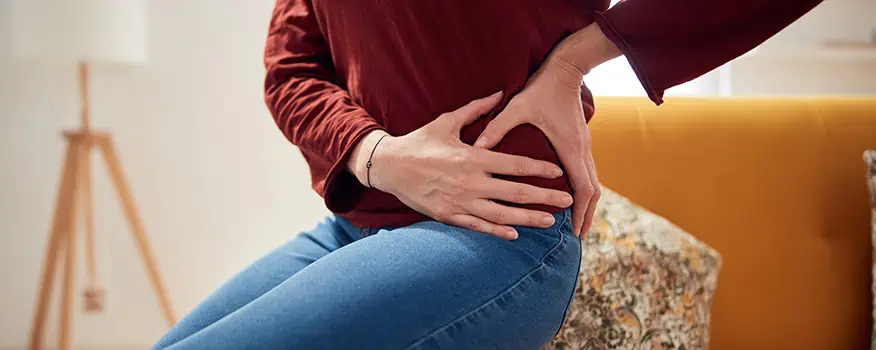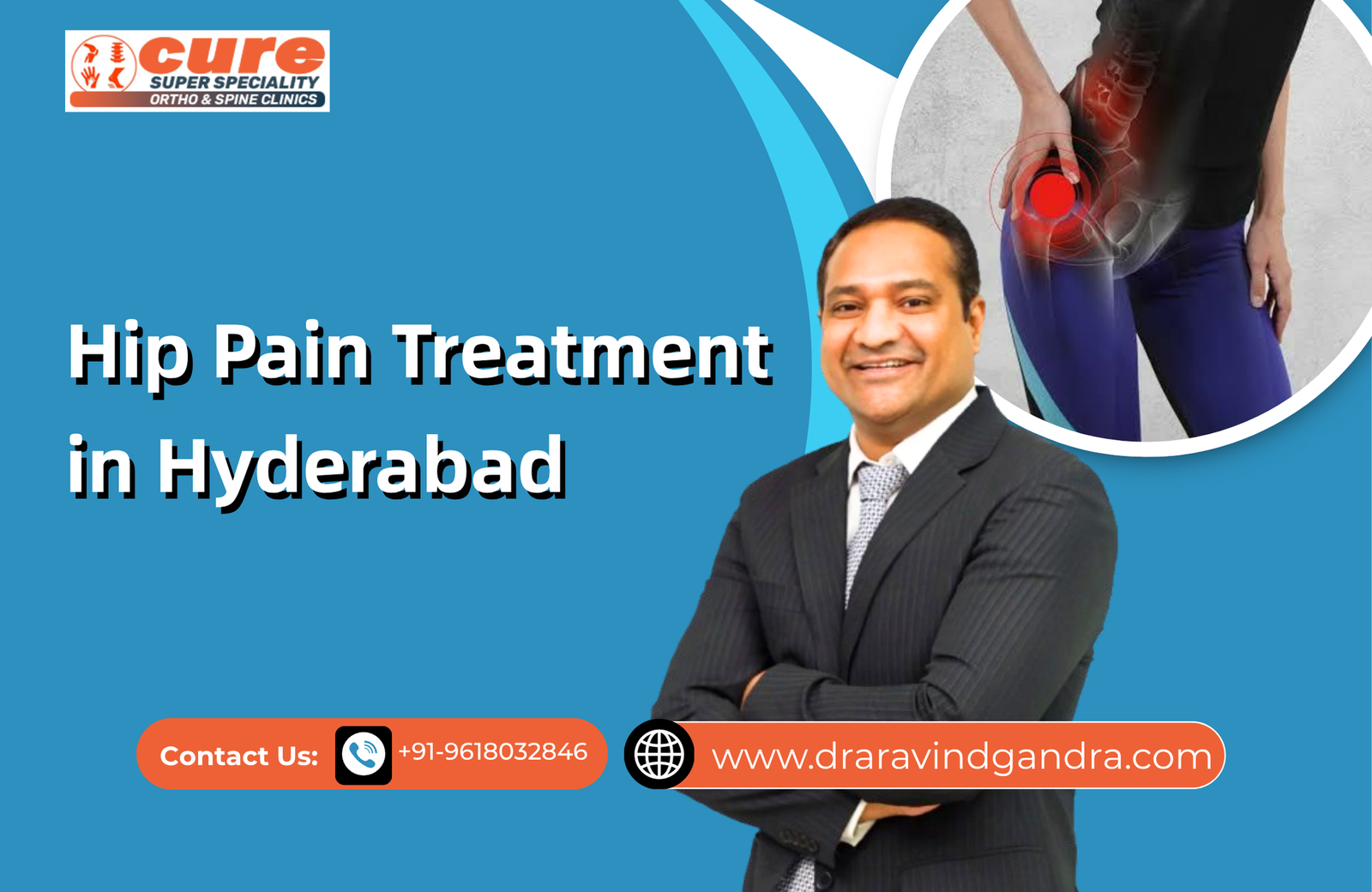Introduction:
Nowadays, hip pain isn’t just something that older people are experiencing, but it has become common among younger adults, too. Long hours of sitting, lack of exercise, poor posture, wear and tear in the body, or even certain lifestyle habits can all lead to hip discomfort. Whether it’s an occasional ache after a busy day or a sharp pain that makes it hard to move, hip pain can interfere with daily life and overall comfort.
The good news is that most hip pain can be treated effectively without any further medical complications. With timely diagnosis, proper care, and the right treatment, one can cure his/her hip pain. From simple exercises to advanced medical options, you can manage the pain and regain your mobility to manage your daily tasks.
What Causes Hip Pain?
:max_bytes(150000):strip_icc()/hippainfinal-01-5c86a585c9e77c0001422f94.png)
As mentioned above, hip pain doesn’t occur with aging. It is seen in all age groups because of improper posture, long sitting hours due to work, and many other small injuries. The hip joint handles a lot of your body’s weight, so any strain, injury, or wear and tear can easily lead to discomfort.
Here are a few reasons why people are seeing hip pain:
- Arthritis: The most common cause, when the joint cartilage wears down, leading to stiffness and mild to severe pain.
- Bursitis: Inflammation of the small fluid sacs (bursae) around the joint, causing sharp pain on the side of the hip.
- Muscle or Tendon Strain: Overuse, sudden movements, or weak muscles can cause soreness or mild swelling.
- Injury or Fracture: A fall or accident can lead to a fracture, especially in older adults.
- Labral Tear: Damage to the cartilage around the hip socket can cause pain, locking, or clicking sensations.
- Avascular Necrosis: When blood flow to the hip bone is reduced, it can damage the bone and cause pain over time.
- Referred Pain: Sometimes, pain in the lower back or spine can radiate to the hip area.
What are the symptoms of Hip Pain?

Hip pain can show up in different ways depending on the cause. Some people feel a mild ache, while others experience sharp pain that limits movement. Common symptoms include:
- Pain in the groin, outer hip, buttock, or thigh
- Stiffness in the hip joint, especially after sitting or sleeping
- Swelling or tenderness around the hip
- Pain while walking, climbing stairs, or bending
- A clicking or popping sound when moving the hip
- Limited movement or difficulty rotating the leg
- Limping or feeling like one leg is weaker than the other
Diagnosis of Hip Pain:

Finding the root cause of hip pain is the first step toward effective treatment. Doctors usually start with a detailed medical history and a complete physical examination to check your hip’s movement, flexibility, and areas of tenderness.
To get a clearer picture, they may recommend:
- X-rays: to see bone structure, arthritis, or fractures
- MRI or CT scans: to check soft tissues, cartilage, labral tears, or avascular necrosis
- Ultrasound: for bursitis or tendon issues
- Lab tests: if infection or inflammatory conditions are suspected
A proper diagnosis helps the doctor choose the most suitable treatment plan, whether it’s physiotherapy, medications, injections, or surgery.
Treatment Options for Hip Pain:
Hip pain can often be managed effectively with the right treatment. Depending on the cause and severity, options range from simple home care to surgical treatment.
1. Non-Surgical Treatments
- Medications: Pain relievers and anti-inflammatory drugs to reduce pain and discomfort.
- Physiotherapy & Exercises: Strengthen hip muscles, improve flexibility, and support joint movement.
- Lifestyle Modifications: Weight management, posture correction, and avoiding activities that worsen pain.
- Hot & Cold Therapy: Helps reduce inflammation and ease muscle tension.
- Injections: Corticosteroids or PRP (Platelet-Rich Plasma) for persistent pain in specific cases.
2. Surgical Treatments
- Hip Arthroscopy: Minimally invasive surgery to repair labral tears or remove damaged tissue.
- Osteotomy: Bone realignment surgery, usually for younger patients with structural issues.
- Hip Replacement (Partial or Total): Recommended for advanced arthritis or severe joint damage.
- Revision Surgery: Needed if a previous hip replacement has complications.
Choosing the right treatment depends on the underlying cause, age, activity level, and overall health. A doctor can guide the best approach for long-term relief and improved mobility.
Choosing the Best Doctor for Hip Pain in Hyderabad:

When selecting a hip specialist, patients should look for:
- Experience and expertise: Years of practice and specialization in hip treatments and surgeries.
- Patient reviews and success stories: Real feedback that builds trust.
- Use of advanced technology: Modern techniques like minimally invasive hip surgery for faster recovery.
- Personalized care: A doctor who listens, understands your concerns, and explains every step clearly.
Dr. Aravind Gandra is one of the best orthopedic surgeons in Miyapur, Hyderabad, with extensive experience in treating hip pain, labral tears, arthritis, and complex joint conditions. He is well-known for using advanced and minimally invasive techniques, ensuring effective treatment with faster recovery. With a compassionate and professional approach, Dr. Gandra has helped countless patients regain mobility and live pain-free lives. Patients trust Cure Clinic, Chandanagar, Hyderabad, a leading orthopedic center offering safe, effective, and patient-focused hip care with modern facilities and comprehensive rehabilitation programs.
Choosing the Best Hospital for Hip Treatment in Hyderabad:
Choosing the right hospital is just as important as choosing the right doctor. A well-equipped hospital ensures patient safety, smooth surgery, and faster recovery. The best hospitals for hip pain treatment provide:
- Modern facilities: Advanced operation theaters and diagnostic tools.
- Experienced team: Skilled surgeons, physiotherapists, and staff.
- Patient-focused care: Guidance through diagnosis, treatment, and recovery.
In Hyderabad, Cure Super Specialty Clinic, Chandanagar, is trusted by patients for its modern facilities and expert team. With advanced surgical technology, personalized care, and a strong focus on rehabilitation, Cure Clinic has built a reputation as one of the best hospitals for spine surgery in Hyderabad. Patients value its local credibility, experienced doctors, and commitment to safe recovery.
Rehabilitation and Recovery:
Recovery after hip treatment or surgery varies from person to person, depending on the type of procedure and the patient’s overall health. Some patients may feel improvement within a few weeks, while others may take a few months to regain full mobility and strength.
A typical recovery process includes:
- First few weeks: Rest, limited movement, and follow the doctor’s instructions carefully.
- Gradual improvement: Pain decreases, flexibility improves, and light daily activities can be resumed.
- Complete recovery: With proper care, most patients return to normal life, work, and exercise within a few months.
Physiotherapy and lifestyle adjustments play a crucial role in achieving the best results. Physiotherapy helps strengthen hip muscles, improve flexibility, and prevent future problems. Patients are also advised to maintain a healthy weight, use supportive footwear, and follow proper posture habits.
At Cure Clinic, Chandanagar, Hyderabad, recovery doesn’t end after treatment. Dr. Aravind Gandra and his team provide personalized post-treatment care, including physiotherapy support, regular check-ups, and lifestyle guidance, ensuring patients heal faster and return to daily routines with confidence.
How to Prevent Hip Pain:
While some causes of hip pain cannot be completely avoided, certain habits can help reduce the risk and keep your hips healthy:
- Regular exercise: Strengthen hip muscles and improve flexibility.
- Maintain a healthy weight: Reduces stress on hip joints.
- Good posture: While sitting, standing, and walking.
- Avoid prolonged sitting: Take breaks to stretch and move.
- Proper footwear: Supports joints and prevents strain.
- Healthy lifestyle: Balanced diet, adequate calcium and vitamin D, and avoiding high-impact activities without preparation.
Conclusion:
Hip pain can affect every part of your life, from your ability to walk, sit, or stay active to your overall comfort and well-being. While not every case requires surgery, when it does, having the right specialist by your side makes all the difference.
Dr. Aravind Gandra, one of the leading orthopedic surgeons in Hyderabad and Miyapur, is widely trusted for his expertise, precision, and compassionate approach to patient care. Over the years, he has helped countless patients find relief from hip pain, regain mobility, and return to an active, pain-free life. His ability to combine advanced surgical techniques with personalized treatment ensures that every patient feels supported at every stage — from diagnosis to rehabilitation.
At Cure Clinic, Chandanagar, Dr. Gandra and his dedicated team provide the highest quality hip care in a safe and comfortable environment. With modern facilities, advanced technology, and strong rehabilitation support, patients are assured of the best outcomes.
If you’re experiencing hip pain, stiffness, or joint problems, don’t ignore the signs. Book a consultation with Dr. Aravind Gandra at Cure Clinic, and take the first step toward a healthier, pain-free future.

